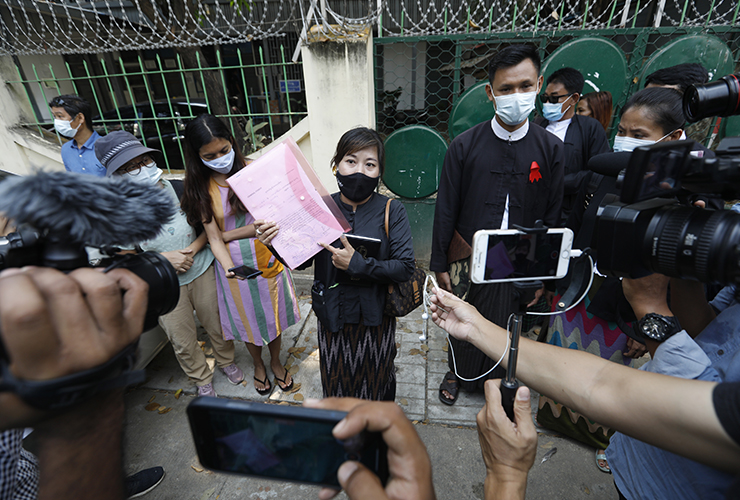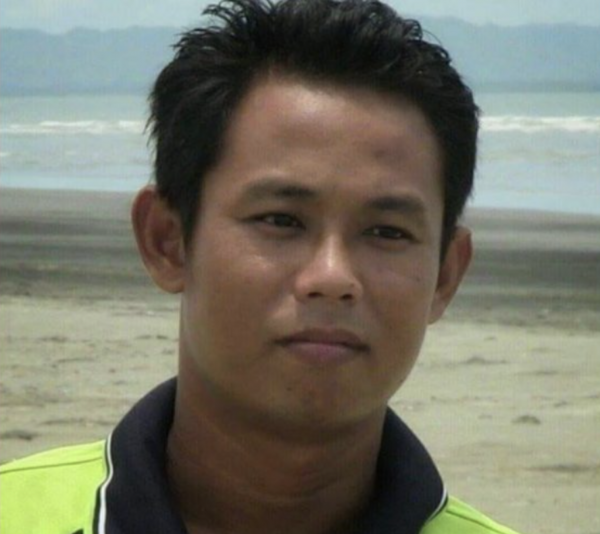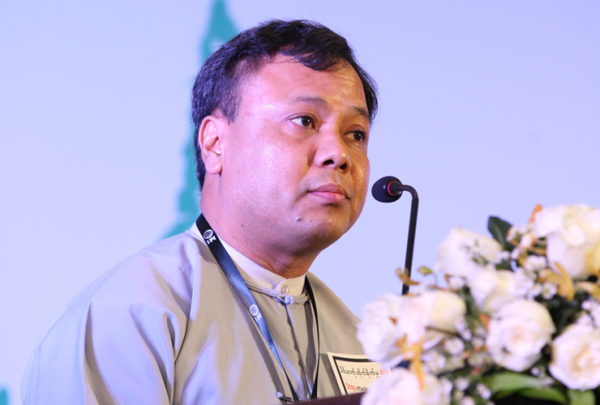Since the military coup in Myanmar in early February, the regime has shut down many media houses and arrested at least 80 journalists, of whom 45 remain behind bars. Owing to these increasing threats many journalists are preparing to leave the country, while banned media organizations are trying to set up offices overseas to continue their work.
Aye Min That worked as a reporter for Reuters in Myanmar. By the end of March, she fled to Thailand. “I decided to leave because of the increasing threats, particularly police forces coming to journalists’ homes to arrest them”, she told the International Press Institute (IPI). After several journalists had been arrested from their homes and the government began to put journalists on its wanted lists, she began to think of an exit strategy, fearing that they would eventually come for her.
“I have had a few scary experiences. One of which was that while I was not at home, someone was standing in front of my apartment. They were about five people who came to my apartment and banged on my door for a while”, she said. “A friend was in my flat at the time, she didn’t open the door but heard them saying my name and address. After a while, they left, but at that point I said to myself, no matter who these people are, I should probably leave.”
After this Aye Min That started to pack her bags and went through the necessary papers to apply for a visa in Thailand, she said. “I got a lot of support from the Myanmar Journalist Support Network, a group of people inside and outside the country who not only helped me financially, as it is quite expensive to leave the country, but also guided me through the process.”
Since Aye Min That has U.S. citizenship, it was not difficult for her to leave for neighbouring Thailand. Other journalists from Myanmar, meanwhile, have had more difficulties leaving the country. This is partly because many do not possess the necessary language skills to deal with visa forms, or have little experience of travelling, That said. “Some of these journalists have never left the country or don’t even have passports and are basically trapped in Myanmar”, she added. “I’ve also helped a few people fill out the documents to leave the country and helped them through the process.”
For many journalists, the stress of organizing their departure is coupled with the constant fear of being stopped or even arrested, making small matters more challenging, Aye Min That said. “If you’ve never been on a plane before, how are you supposed to know what a flight number is, let alone the emotional distress of being in a situation where you’re just scared all the time.”
“We are still in the emergency phase”
The situation in Myanmar has deteriorated considerably in recent weeks. Journalists, activists and prominent opponents of the military junta have increasingly become the target of prosecution and arbitrary arrests. At the same time, the regime is tightening its grip with increased violence against protestors. Military and law enforcement agencies have resorted to brutal violence during protests resulting in numerous deaths over the past weeks.
“We initially had a phase where people wanted to stay and contribute to the civil disobedience movement and keep an eye on what’s going on”, Anrike Visser, who works as a media development consultant in Myanmar, told IPI. “Now, they still want to do that but since the 27 of March the response by the military has been more of a hard crackdown. People are tortured and killed in detention, women have been sexually abused, people are just randomly shot on the streets. It’s really turning into a lawless society.”
This has also affected the safety of journalists, who are now being charged under draconian laws, especially Article 505 (a) of the criminal code, which criminalizes publishing or circulating content that allegedly causes fear or spreads false news. Those convicted face up to three years in prison.
“The situation for journalists is getting more dangerous by the day. So, I think the numbers of journalists that realise they need to leave will increase”, she said.
Since the easiest option is to go to neighbouring countries, many journalists flee to Thailand or India and plan their next move from there. “Right now, we are still in the emergency phase, people are literally running for their lives”, she said. “The following question will be, if they can stay and work from abroad”.
In the meantime, the Thai government has pushed back the refugees coming from Myanmar and rejected UNHCR’s demand to grant them refugee status.
Setting up abroad
Many members of independent media, such as Myanmar Now, The Irrawaddy and Mizzima, have fled abroad and are continuing their work from exile. But they also rely on journalists who continue to work on the ground.
“To set up an office abroad does not mean that you pull out everything and that you try to report from abroad, you just have a different structure and processes”, Visser said. “It’s not often that you pull out everyone. The ones who are leaving are mostly the chief officer, some high-profile journalists, some that have been very vocal or that have ties to their family that put them in danger.”
“However, they still have many of their journalists inside the country, operating incognito on the ground”, Visser continued. “Often these are journalists that are less well known and haven’t been too critical or even citizen journalists, who share basic information”.
Trying to keep information public
Thin Lei Win, a freelance journalist from Myanmar, described a similar situation. “Just being a journalist now makes you are target”, she said. “Unless you are a journalist that works for a news outlet that is openly friendly towards the junta, you are at risk of being arrested arbitrarily.”
Due to this, some journalists have decided to seek refuge abroad and continue their work from there. “There are quite a few journalists that have left Myanmar, and many others are planning to”, Thin Lei Win said. “I know at least half a dozen journalists that have left in the last weeks.”
Relocating, however, brings a lot of practical challenges as to how these editorial offices can then continue to work, Thin Lei Win explained. “They are going to need a lot of support in terms of setting it up in a different place, providing salaries, also of having a network of contacts and stringers in Myanmar that are willing to risk their lives to feed them information.”
For this, citizen journalists are increasingly setting out to report on the situation in Myanmar, replacing many journalists who were arrested or had to flee, Thin Lei Win said.
However, it has become very dangerous to share information as the regime has been monitoring and censoring the internet since the coup. Despite these dangers, the news output from Myanmar hasn’t decreased dramatically, and many are taking the risk to use unsafe ways to share news and support reporting. “They understand the importance of keeping the issues on an international stage, and to continue informing people both within the country as well as outside on what’s happening”, Thin Lei Win said.
News outlets abroad
Myanmar has a very long tradition of media in exile. Many news organs, such as the Irrawaddy, Democratic Voice of Burma or Mizzima, were founded by journalists in exile and have since maintained offices abroad. Some of the journalists also have a legal status in the respective countries where they lived in exile. However, most people cross the borders illegally, and try to apply for migrant or refugee status.
“There are a number of organisations offering mostly financial emergency support, so people can pay salaries or if they need to move somewhere else”, Jane McElhone, an independent media consultant specializing on Myanmar, said. “One of the big problems, however, is that people who go to neighbouring countries need assistance in getting legal status to be able to work there.”
According to McElhone, help with getting visas or work permits is among the most important things journalists need when they are trying to cross the border or are already in the country. “People really want support in getting visas. They don’t want to go somewhere and not being able to work”, she said.
In the past weeks, Indian authorities in the northeastern state of Manipur have given refuge to journalists charged in Myanmar under Article 505 (a).
Pressure continues
The military’s oppressive tactics show little sign of abating despite international condemnation.
Ko Swe Win, an investigative journalist and the editor-in-chief of the independent news outlet Myanmar Now received the 2021 Shorenstein Journalism Award on April 27. Ko Swe Win is managing the editorial team of Myanmar Now from exile.
On World Press Freedom Day, the U.S., the UK, and EU and several of its member states, among others, issued a joint statement calling for “the immediate release of all media workers, the establishment of freedom of information and communication and the end of all internet restrictions in Myanmar”.
But meanwhile, the military regime continues to try to suppress the dissemination of information. On Monday, April 26, the Myanmar military junta announced it would take action against the Assistance Association for Political Prisoners, which has documented deaths and arrests by military regime troops since the military coup. Many international organizations, including the United Nations, and various media outlets have relied on the data provided by the AAPP.
On Sunday 2 May, the military junta revoked the licence of the local independent newspaper Myitkyina News Journal, while three of its reporters remain behind bars.
Among the most recent arrests are Japanese journalist Yuki Kitazumi, who was taken from his home by police forces, and charged under Article 505(a) of Myanmar’s Penal Code. On April 27, Ko Nay Myo Lin, editor-in-chief of Voice of Myanmar, and a fellow reporter were arrested after police interrogations. On April 21, reporter Ko Naing Lin Tun was arrested while covering the protests and suffered from a head wound after being grazed by a bullet.
A journalist and an editor at Voice of Myanmar, Mandalay-based media, were detained.Editor Ko Nay Myo Lin and journalist Ko Shine Aung had been brought by the junta to Mandalay’s palace for asking questions and were arrested at the palace.#WhatsHappeningInMyanmar#Apr27Coup pic.twitter.com/hfwr71LlhR
— Poe Thet Htar (@PoeThetHtar1) April 27, 2021
Since early April, the military junta has been publishing lists of celebrities and journalists who it claims affect the stability of the state under section 505(a) of the country’s criminal code. These public lists contain the full names, pictures, addresses and Facebook accounts of the journalists who allegedly spread misinformation and support “unlawful” behaviour. Those charged under this provision face three years imprisonment.
Meanwhile, the government has continued to shut down the internet, disabling mobile data for over five weeks and blocking content on online platforms, and nightly near-total shutdowns, as reported by the internet monitoring group NetBlocks.
Protests in Myanmar have been ongoing since the military coup in early February. According to Assistance Association for Political Prisoners, in the course of the protests at least 766 individuals have been killed by security forces and a total of 4,674 people arrested, of whom 3614 currently remain in detention.



